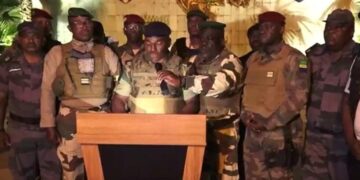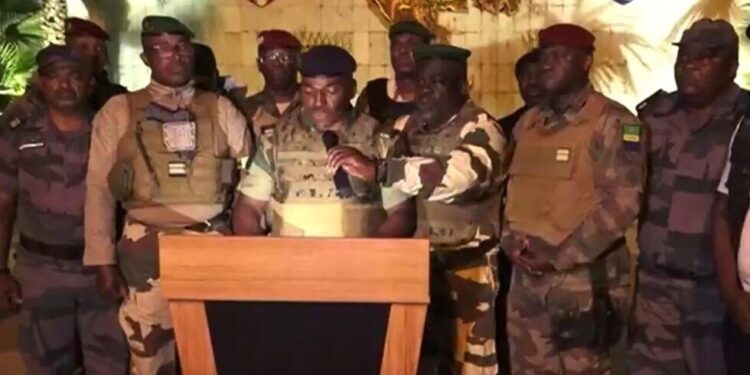LIBREVILLE, Aug 30 (Reuters) – A group of senior Gabonese military officers appeared on national television in the early hours of Wednesday and said they had taken power, minutes after the state election body announced President Ali Bongo had won a third term.
Appearing on television channel Gabon 24, the officers said they represented all security and defence forces in the Central African nation. They said the election results were cancelled, all borders closed until further notice and state institutions dissolved.
Loud sounds of gunfire could be heard in the capital Libreville, a Reuters reporter said, after the television appearance.
There was no immediate comment from the government of the OPEC-member nation. There were no immediate reports on the whereabouts of Bongo, who was last seen in public when he cast his vote in the election on Saturday.
“In the name of the Gabonese people … we have decided to defend the peace by putting an end to the current regime,” the officers said in a statement.
Advertisement · Scroll to continue
As one officer read the joint statement, around a dozen others stood silently behind him in military fatigues and berets.
The servicemen introduced themselves as members of The Committee of Transition and the Restoration of Institutions. The state institutions they declared dissolved included the government, the senate, the national assembly, the constitutional court and the election body.
Reuters Graphics
If successful, the coup would represent the eighth in West and Central Africa since 2020. Coups in Mali, Guinea, Burkina Faso, Chad and Niger have undermined democratic progress in recent years.
Advertisement · Scroll to continue
Last month, the military snatched power in Niger, sending shockwaves across the Sahel and sucking in global powers with strategic interests at stake.
Tensions were running high in Gabon amid fears of unrest after Saturday’s presidential, parliamentary, and legislative vote, which saw Bongo seeking to extend his family’s 56-year grip on power while the opposition pushed for change in the oil and cocoa-rich but poverty-stricken nation.
Advertisement · Scroll to continue
A lack of international observers, the suspension of some foreign broadcasts, and the authorities’ decision to cut internet service and impose a night-time curfew nationwide after the poll had raised concerns about the transparency of the electoral process.
Gabon foiled an attempted military coup in January 2019 after soldiers briefly seized the state radio station and broadcast a message saying Bongo, who had suffered a stroke months earlier, was no longer fit for office.
Advertisement · Scroll to continue
The situation was restored hours later after two of the suspected coup plotters were killed and others arrested.
IN POWER SINCE 2009
The Gabonese Election Centre said earlier on Wednesday Bongo won the election with 64.27% of the vote and that his main challenger, Albert Ondo Ossa, had come in second place with 30.77%.
Bongo, 64, who succeeded his father Omar as president in 2009, had contested against 18 challengers, six of whom backed Ondo Ossa in an effort to narrow the race.
The government has said the web blackout and curfew are necessary to prevent the spread of fake news and to protect public safety. Bongo’s disputed 2016 election win provoked violent protests that saw the parliament building torched.
His team have rejected allegations of fraud by Ondo Ossa and his opposition alliance after a vote marred by numerous polling stations opening several hours late.
The alliance Alternance 2023 also reported other alleged irregularities including that ballot slips for its candidates had not been deployed correctly in some areas. Reuters could not independently verify the claim.
The European Union was not invited to observe this election. EU monitors previously questioned the validity of Bongo’s narrow victory in the 2016 presidential vote.
On Monday, media watchdog Reporters without Borders (RSF) voiced concern about the internet block and Gabon’s temporary suspension of broadcasts by French international news outlets RFI, France 24, and TV5 Monde.
“RSF denounces a series of attacks on press freedom and information pluralism, facts likely to compromise (the) general election’s transparency,” it said in an online post.
The opposition has disputed both of Bongo’s previous electoral victories, citing fraud. He first came to power in a 2009 vote following the death of his father Omar Bongo before being re-elected in 2016.
By Reuters











